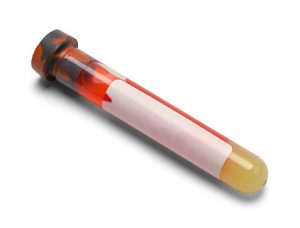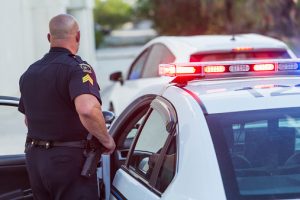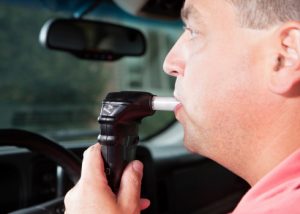DWI Defense for Commercial Drivers in Houston
 A driver in Texas who is found guilty
of operating a vehicle while impaired by
alcohol can face a
suspension of a personal
driver's license. Not being able to drive is a major
problem for most people, as work and
family commitments may be difficult to
fulfill without a valid driver's
license. For those with a commercial
driver's license (CDL) however,
the loss of a license can mean the end
of a career.
A driver in Texas who is found guilty
of operating a vehicle while impaired by
alcohol can face a
suspension of a personal
driver's license. Not being able to drive is a major
problem for most people, as work and
family commitments may be difficult to
fulfill without a valid driver's
license. For those with a commercial
driver's license (CDL) however,
the loss of a license can mean the end
of a career.
A commercial driver's license holder can have his CDL suspended both for a drunk driving conviction while operating his own personal vehicle and for a drunk driving conviction while operating his commercial vehicle. Because conviction can lead to a lengthy CDL suspension or a lifetime revocation, it is very important for a Houston commercial driver to raise a strong DWI defense if he is accused of breaking Texas laws on impaired driving.
Why You Need a Good DWI Defense When You Have a CDL
Most truckers in Texas who drive passenger vehicles or big trucks are subject to regulations established on the national level called Federal Motor Carrier Safety Regulations (FMCSRs). The regulations are passed and enforced by Federal Motor Carrier Safety Administration (FMCSA).
FMCSR 383.51 is the relevant federal regulation addressing the situations under which a commercial license can be suspended. A CDL suspension may occur after:
- A refusal to take a blood alcohol concentration (BAC) test when there is probable cause the driver is impaired by drugs or by alcohol.
- A conviction for driving drunk while in a personal car.
- A conviction for driving under the influence of a controlled substance, or any combination of drugs and alcohol, while in a personal car.
- A conviction for driving drunk or under the influence of drugs or controlled substances while operating a commercial motor vehicle.
A commercial motor vehicle is typically defined as a truck with a gross weight rating of 26,001 or more pounds or a tow trailer of 10,000 or more pounds. Vehicles that are able to transport 16 or more people, including the driver, may also be considered commercial vehicles.
When a driver is in a commercial vehicle and refuses to take a BAC test or is considered to be impaired by alcohol or other substances, the driver could face:
- A one year CDL suspension for a first conviction.
- A three year CDL suspension for a first conviction while operating a vehicle that contains HAZMAT/ hazardous material.
- A lifetime revocation of a CDL for a second conviction.
Under Texas law, as throughout the United States, there is a lower limit set for drivers who are operating a commercial motor vehicle. A CDL holder in a truck or passenger vehicle is considered to be in violation of impaired driving laws as soon as his BAC is .04 percent. The lower limit is set at half of the standard limit in a passenger car.
Because a DWI can mean the suspension or lifetime loss of your CDL, you need to develop a very effective DWI defense if you don't want to lose your professional license and career.





 Texas Vehicle Code Section 724
Texas Vehicle Code Section 724 When police pull you over, they may
ask you questions like whether you have
consumed any alcohol. A law enforcement
officer may also ask you how much
you've had to drink.
When police pull you over, they may
ask you questions like whether you have
consumed any alcohol. A law enforcement
officer may also ask you how much
you've had to drink.
 In the state of Texas, a driver who
refuses to take a blood or breath test
after a DUI arrest can have his license
suspended for between 90 days and two
years. The
In the state of Texas, a driver who
refuses to take a blood or breath test
after a DUI arrest can have his license
suspended for between 90 days and two
years. The
 After you are
After you are
 Drunk drivers throughout Harris
County, Montgomery County and
surrounding areas face many serious
criminal penalties when they are
convicted of driving under the
influence. A criminal record can limit
future job opportunities. The temporary
suspension of a license can make it
difficult to fulfill personal,
professional and family obligations. The
record of the DWI can raise insurance
costs for years to come, and the fines
and costs from the trial and penalties
can be financially devastating.
Drunk drivers throughout Harris
County, Montgomery County and
surrounding areas face many serious
criminal penalties when they are
convicted of driving under the
influence. A criminal record can limit
future job opportunities. The temporary
suspension of a license can make it
difficult to fulfill personal,
professional and family obligations. The
record of the DWI can raise insurance
costs for years to come, and the fines
and costs from the trial and penalties
can be financially devastating.
 In Harris County, Montgomery County,
Houston and the entire state of Texas,
drivers give implied consent when they
get behind the wheel. Essentially, this
means they have given their permission
for law enforcement to test their
blood-alcohol concentration. Police
cannot just test your BAC whenever they
want to, though. They will need to have
probable cause or a reasonable suspicion
that you have consumed too much alcohol
to be safely behind the wheel.
In Harris County, Montgomery County,
Houston and the entire state of Texas,
drivers give implied consent when they
get behind the wheel. Essentially, this
means they have given their permission
for law enforcement to test their
blood-alcohol concentration. Police
cannot just test your BAC whenever they
want to, though. They will need to have
probable cause or a reasonable suspicion
that you have consumed too much alcohol
to be safely behind the wheel.
 In the state of Texas, drivers who
have two or more drunk driving
convictions over a period of five years
are required to install an ignition
interlock device in their vehicles.
Drivers who are arrested for a first
offense must also have an ignition
interlock device installed on cars that
they own. Motorists must pay for the
cost of the ignition interlock device.
The device typically must remain on a
vehicle for at least one year following
the period when a license is suspended.
In the state of Texas, drivers who
have two or more drunk driving
convictions over a period of five years
are required to install an ignition
interlock device in their vehicles.
Drivers who are arrested for a first
offense must also have an ignition
interlock device installed on cars that
they own. Motorists must pay for the
cost of the ignition interlock device.
The device typically must remain on a
vehicle for at least one year following
the period when a license is suspended.
 If you are charged with driving
impaired and your blood-alcohol
concentration is over-the-limit in
Texas, it may seem difficult to mount a
defense. After all, the science says
that you are too impaired to be safely
on the roads.
If you are charged with driving
impaired and your blood-alcohol
concentration is over-the-limit in
Texas, it may seem difficult to mount a
defense. After all, the science says
that you are too impaired to be safely
on the roads.

